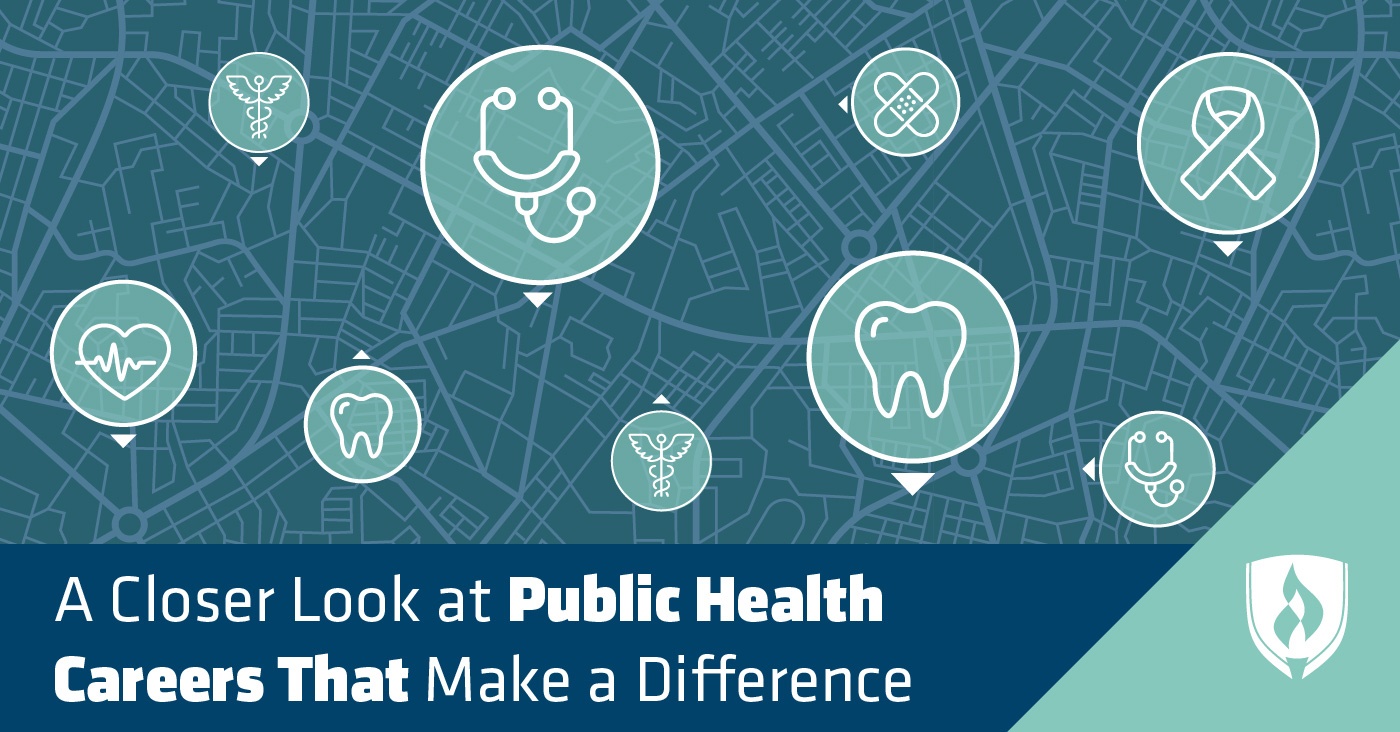
Some professionals have always been recognized as everyday heroes: firefighters, law enforcement officers and nurses have long been seen as selfless people who have dedicated their lives to helping others. Now public health workers are rightfully moving up the list!
Public health professionals have been quietly making a difference in communities across the nation for decades. But when the COVID-19 pandemic threatened lives around the globe, their essential work was put into the spotlight. Now no one can deny that these at times easy-to-overlook healthcare professionals serve a vital role in keeping people safe and healthy.
You’re interested in pursuing work in this important field, but you’d like to learn more about public health careers and what they entail. Join us as we gain an insider’s view of the public health field, including the types of public health careers you could consider if you’re passionate about the health and safety of others.
What is public health?
Public health is a sphere of healthcare that’s concerned with protecting entire communities from dangers that could compromise their health. “These populations can be as small as a local neighborhood, or as big as an entire country or region of the world,” according to the Centers for Disease Control and Prevention (CDC).
This is a big task that includes everything from disease prevention to reducing air or water pollution. “Public health touches the air we breathe, the water we drink, even the food we put inside our bodies,” says Andrew Roszak, executive director of the Institute for Childhood Preparedness and 20-year public health professional. “It is an enormous field that covers a wide span of topics and issues, all with one common theme: to keep the public as safe and healthy as possible.”
You might think individuals can manage their own healthcare needs, but that isn’t always the case. Some issues, like vaccinations and infectious disease, require years of specialized research. Other health problems affect vulnerable populations like lower-income households or people with certain genetic risk factors. It falls to public health professionals to create high-quality programs for addressing these issues.
“Public health is about protecting people from things they don’t know about or fully understand. And about helping those that don’t have access to medical care or healthy food,” says Steven Chevalier, food safety consultant with Cloudbreak Environmental. “The list of services public health provides is seemingly endless, and the profession is incredibly honorable to be a part of.”
Why is public health important?
The day-to-day work of public health professionals takes place largely behind the scenes. It’s easy to take their work for granted if you don’t know how to recognize the contributions they’ve made to society. However, with COVID-19 bringing the globe to a near standstill, a new spotlight has been placed on the field’s importance.
But public health work is valuable even when there’s not a pandemic—and much of the work they do extends beyond developing vaccines and mitigating the spread of disease. “Although largely invisible, the role that public health plays is massive and of the utmost importance,” Roszak says.
In the last century alone, the public health field has contributed to the decline in heart disease and strokes, greater control of infectious diseases and a decrease in deaths from motor-vehicle accidents. Without this important field of work, communities could face unsafe food preparation practices, hazardous levels of air pollution, reduced access to basic medical care, increased gun violence and a lack of education on health issues like diabetes and obesity.
Public health directly affects our well-being and quality of life as individuals. This makes public health a field that’s vitally important to each of us.
Types of public health careers that are making a difference
Public health professionals can choose from a variety of work settings thanks to the far-reaching initiatives of this field. Take a look at these employers who all need the services of dedicated public health workers.
Public health agencies
Public health agencies like the Centers for Disease Control and Prevention (CDC), the National Institutes of Health (NIH) and the Food and Drug Administration (FDA) represent just a handful of the government organizations focused solely on our nation’s public health.
Public health workers in this setting typically focus on big-picture initiatives that steer the country toward better health through research, education and safety regulations. Agencies like these offer job titles such as research associate, biostatistician and public health information officer.
Local government
Not all government public health initiatives take place inside high-profile agencies like the CDC. Governments at the local and state levels also need public health workers to keep their communities safe. These professionals might be involved in environmental health, social work, emergency preparedness and ensuring access to vital documents like birth and death certificates.
As a government public health worker, Chevalier says “each day brings new challenges, requires resilience and ability to adapt, as well as maintaining a focus of meeting the public's needs by preventing the spread of disease and providing access to care and nutrition.”
Nonprofit organizations
The nonprofit sector has plenty of organizations involved in public health, including well-known names like the American Red Cross. Every nonprofit organization has its own unique mission, but typically they are “either working to educate others on the importance of health or on providing necessary services for individuals to keep them healthy,” says Melissa Morris, exercise physiologist, sports nutritionist and writer at QuickQuote.
Depending on the organization’s focus, public health careers in this sector could include public health educators, community health specialists or emergency preparedness coordinators. Some of these nonprofit careers are more “boots on the ground” than large government agencies, giving workers more opportunities to work directly with the communities they serve.
Healthcare providers
Many healthcare providers offer careers for public health professionals within their clinics or hospitals. In this setting, public health workers may be educating patients one-on-one about a health condition, or they might be coordinating events for larger groups, like a seminar on quitting smoking.
Public health professionals with an advanced degree may also work in the administration of a clinic or hospital. In this role, they can study the populations their healthcare facility serves and make policy decisions that benefit the health of those groups.
Environmental agencies
Public health is closely tied to environmental health. “Do you enjoy breathing in clean air? Public health makes sure air quality is important. Do you want to make sure the water you drink is clean and free of toxins? Public health makes sure we have access to clean drinking water,” Morris says.
Environmental agencies perform work that improves the health of communities everywhere. They collect and analyze data on pollutants and toxins, advise on environmental policies, find sustainable solutions to environmental problems and communicate environmental issues to the communities they serve.
Improving public health one day at a time
Public health professionals make the world a better place for everyone by serving vulnerable populations and keeping communities healthy. Now that you know more about the different types of public health careers, you could be picturing yourself filling one of these roles.
Sound interesting? Learn more about another crucial component of public health with our article, “What Is Epidemiology? Peering Into This Public Health Topic”.
Related Articles:
- What Can You Do With a Public Health Degree? Exploring Your Options
- Master of Public Health vs. Master of Healthcare Administration: Which Is Right for You?
- Health 3.0 and the History of Healthcare
- Nuclear Medicine Technologist vs. Radiologic Technologist
- 7 Hands-on Healthcare Jobs You Can Land Without a Bachelor's Degree
- 5 Jobs Similar to Nursing You Shouldn't Overlook
- The Anatomy of a Healthy Medical Assistant Resume
- Health Information Trends: How Healthcare Data Analytics Can Improve Patient Outcomes




